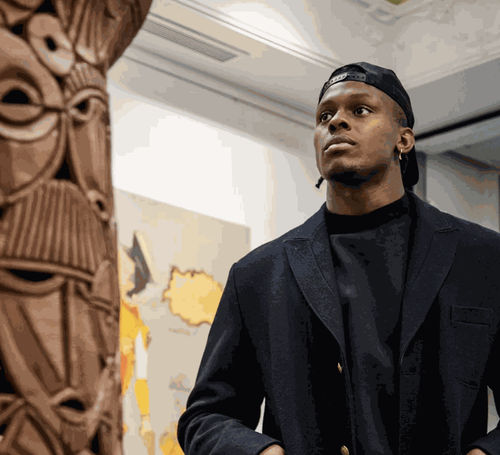Like so many of us, Maro Itoje’s love of art truly spawned when it came to doing up his apartment. Confronted by the prospect of four barren walls he took matters into his own hands. And, how better, than to do things his own way? Maro Itoje – ‘super Maro’ to the uninitiated – needs little introduction. Word that I’m interviewing him spreads fast. Friends, their partners – their parents – all have something to contribute or a question to ask the one-time Tatler cover. Whether their curiosity is down to his rugby prowess, his fashion credentials, his political know-how or his philanthropy. It’s safe to say, the Harrow-educated 26-year-old is rugby’s biggest star since Jonny Wilkinson at the heights of his free-kicking World Cup power over a decade ago.
Alongside Itoje’s all-encompassing professional rugby career (we Zoom bright and early so as to fit in an exchange prior to training) he also has a number of ‘side hustles’ – the most recent being his foray into the lofty world of art. Opening imminently, on 20 May, is Itoje’s inaugural exhibition he has co-curated, A History Untold. The title is pertinent, given the exhibition hones in on the black histories absent from the UK’s curriculum and the narrow – often negative – portrayal of the aspects which are included.
‘I've been to some of the best schools in the land,’ admits Itoje, who won a sports scholarship to Prime Minister-generating Harrow aged 16. ‘And even at those schools, there wasn’t a lot of black history taught – and what I was taught, was either slave trade or the civil rights movement.’ It was left up to Itoje, himself, to discover more about black history on departure from formal education. He chose to pursue his studies (armed with a fleet of As) at Bloomsbury’s characteristically left-leaning SOAS, studying politics. ‘I think it just gives you a narrow picture of what Africa, as a continent, has done or what Africa, as a continent, has contributed to the world we live in,’ he explains, in his balanced, thoughtful way. And that’s what this exhibition, at Signature African Art, a gallery with locations in Lagos and Mayfair, London, seeks to rectify – by celebrating the contributions black figures have made to civilisation and society across the centuries, from mathematics to jazz via the industrial revolution.
